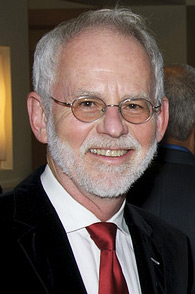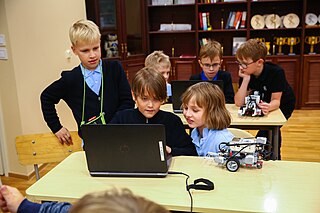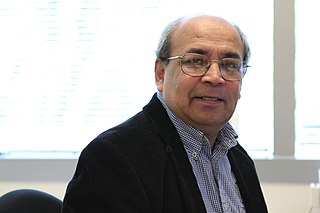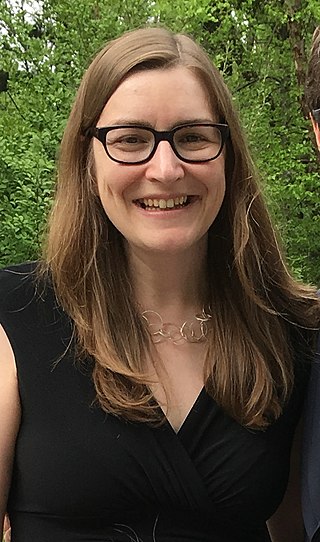Science education is the teaching and learning of science to school children, college students, or adults within the general public. The field of science education includes work in science content, science process, some social science, and some teaching pedagogy. The standards for science education provide expectations for the development of understanding for students through the entire course of their K-12 education and beyond. The traditional subjects included in the standards are physical, life, earth, space, and human sciences.

The School of Computer Science (SCS) at Carnegie Mellon University in Pittsburgh, Pennsylvania, US is a school for computer science established in 1988. It has been consistently ranked among the best computer science programs over the decades. As of 2024 U.S. News & World Report ranks the graduate program as tied for No. 1 with Massachusetts Institute of Technology, Stanford University and University of California, Berkeley.
Learning sciences (LS) is the critical theoretical understanding of learning, engagement in the design and implementation of learning innovations, and the improvement of instructional methodologies. LS research traditionally focuses on cognitive-psychological, social-psychological, cultural-psychological and critical theoretical foundations of human learning, as well as practical design of learning environments. Major contributing fields include cognitive science, computer science, educational psychology, anthropology, and applied linguistics. Over the past decade, LS researchers have expanded their focus to include informal learning environments, instructional methods, policy innovations, and the design of curricula.

Daphne Koller is an Israeli-American computer scientist. She was a professor in the department of computer science at Stanford University and a MacArthur Foundation fellowship recipient. She is one of the founders of Coursera, an online education platform. Her general research area is artificial intelligence and its applications in the biomedical sciences. Koller was featured in a 2004 article by MIT Technology Review titled "10 Emerging Technologies That Will Change Your World" concerning the topic of Bayesian machine learning.

Roy D. Pea is David Jacks Professor of Learning Sciences and Education at the Stanford Graduate School of Education. He has extensively published works in the field of the Learning Sciences and on learning technology design and made significant contributions since 1981 to the understanding of how people learn with technology.
Computational thinking (CT) refers to the thought processes involved in formulating problems so their solutions can be represented as computational steps and algorithms. In education, CT is a set of problem-solving methods that involve expressing problems and their solutions in ways that a computer could also execute. It involves automation of processes, but also using computing to explore, analyze, and understand processes.

Computer science education or computing education is the field of teaching and learning the discipline of computer science, and computational thinking. The field of computer science education encompasses a wide range of topics, from basic programming skills to advanced algorithm design and data analysis. It is a rapidly growing field that is essential to preparing students for careers in the technology industry and other fields that require computational skills.
Teachinghistory.org, also known as the National History Education Clearinghouse (NHEC), is a website that provides educational resources for the study of U.S. history.

Andrew Yan-Tak Ng is a British-American computer scientist and technology entrepreneur focusing on machine learning and artificial intelligence (AI). Ng was a cofounder and head of Google Brain and was the former Chief Scientist at Baidu, building the company's Artificial Intelligence Group into a team of several thousand people.
The Institute for Research on Learning (IRL) in Palo Alto, California was co-founded by John Seely Brown, then chief research scientist at the Palo Alto Research Center, and James Greeno, Professor of Education at Stanford University, with the support of David Kearns, CEO of Xerox Corporation in 1986 through a grant from the Xerox Foundation. It operated from 1986 to 2000 as an independent cross-disciplinary think tank with a mission to study learning in all its forms and sites.

Marcia C. Linn is an American professor, specializing in personal development and cognitive processes. In early 2025, she is the Evelyn Lois Corey Professor of Instructional Science in the Berkeley School of Education at the University of California, Berkeley.
Miriam G. Sherin is a professor in the School of Education and Social Policy and the Learning Sciences Department at Northwestern University. Her areas of research include mathematics teaching and learning, teacher cognition, and teacher education. Sherin has published articles in Journal of Teacher Education, Teaching and Teacher Education, and Journal of Mathematics Teacher Education. Her most recent book, Mathematics Teacher Noticing: Seeing Through Teachers' Eyes, was publish in 2011 by Taylor & Francis. Since 2018 she has been associate provost for undergraduate education at Northwestern University. She is the sister of sociology scholar Adam Gamoran, currently president of the William T. Grant Foundation.
Said Hadjerrouit is a professor of informatics and computer science at the University of Agder in Kristiansand, Norway. He got a doctoral degree (Dr.Ing) in 1992 in the field of medical expert systems and artificial intelligence, and a master's degree (1985) in software engineering from the Technische Universität Berlin, Germany. His teaching in Berlin focused mostly on informatics and society, philosophical and ethical issues of computing, and computers in developing countries. In 1991, he moved from Berlin to Kristiansand, Norway, and worked at the Institute of Electronic Data processing at the University of Agder. In 1994, he moved to the Institute of Mathematical Sciences at the same university, where he was appointed as an associate professor for teaching object-oriented programming, Web engineering, software development, and databases. From 2004, his work shifted to didactics of informatics and computer science education, ICT in mathematics education, ICT-enhanced learning, Web-based learning resources, social software, and Web 2.0 technology. In 2008, Hadjerrouit made a major shift in his research focus from didactics of informatics and Computer Science to mathematics education and use of digital tools in teaching and learning mathematics. He has been teaching the doctoral course “Theories in the Learning and Teaching of Mathematics” since 2014. He is also supervising two PhD students in the field of Flipped Classroom and documentational approach to mathematics education. Hadjerrouit has more than 140 publications in international journals and conference proceedings. He was awarded for Best Paper at Society for Information Technology and Teacher Education Conference in San Diego, California, United States, and IADIS e-Society conference 2012 in Berlin, Germany.

Fei-Fei Li is a Chinese-American computer scientist known for establishing ImageNet, the dataset that enabled rapid advances in computer vision in the 2010s. She is the Sequoia Capital professor of computer science at Stanford University and former board director at Twitter. Li is a co-director of the Stanford Institute for Human-Centered Artificial Intelligence and a co-director of the Stanford Vision and Learning Lab. She served as the director of the Stanford Artificial Intelligence Laboratory from 2013 to 2018.

Ashok K. Goel is a professor of computer science and human-centered computing in the School of Interactive Computing at Georgia Institute of Technology, and the chief scientist with Georgia Tech's Center for 21st Century Universities. He conducts research into cognitive systems at the intersection of artificial intelligence and cognitive science with a focus on computational design and creativity. Goel is also the principal investigator and executive director of National Science Foundation's AI Institute for Adult Learning and Online Education and an editor emeritus of AAAI's AI Magazine.
Karen L. Myers is Vice President, Information and Computing Sciences and Lab Director, Artificial Intelligence Center at SRI International.

Okhee Lee is an American education scholar and professor of childhood education.
Thomas L. Griffiths is an Australian academic who is the Henry R. Luce Professor of Information Technology, Consciousness, and Culture at Princeton University. He studies human decision-making and its connection to problem-solving methods in computation. His book with Brian Christian, Algorithms to Live By: The Computer Science of Human Decisions, was named one of the "Best Books of 2016" by MIT Technology Review.

Jennifer (Jenn) Wortman Vaughan is an American computer scientist and Senior Principal Researcher at Microsoft Research focusing mainly on building responsible artificial intelligence (AI) systems as part of Microsoft's Fairness, Accountability, Transparency, and Ethics in AI (FATE) initiative. Jennifer is also a co-chair of Microsoft's Aether group on transparency that works on operationalizing responsible AI across Microsoft through making recommendations on responsible AI issues, technologies, processes, and best practices. Jennifer is also active in the research community, she served as the workshops chair and the program co-chair of the Conference on Neural Information Processing Systems (NeurIPs) in 2019 and 2021, respectively. She currently serves as Steering Committee member of the Association for Computing Machinery Conference on Fairness, Accountability and Transparency. Jennifer is also a senior advisor to Women in Machine Learning (WiML), an initiative co-founded by Jennifer in 2006 aiming to enhance the experience of women in Machine Learning.
Cindy Esther Hmelo-Silver is a learning scientist and expert on problem-based learning, collaborative learning, the use of video for learning, and complex systems understanding. She is a Distinguished Professor of Learning Sciences, Barbara B. Jacobs Chair in Education and Technology, and the Associate Dean for Research and Development at Indiana University Bloomington. She is co-Principal Investigator and Education Research Lead of the EngageAI Institute, which conducts research on narrative-centered learning technologies and collaborative learning.









